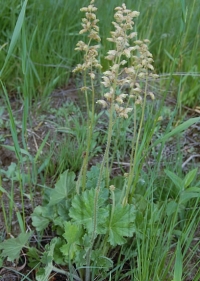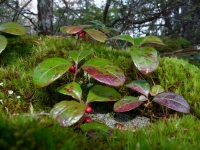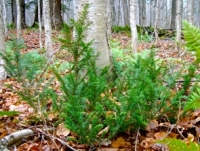

Joel Springsteen
Joel was born and raised in Papua New Guinea. While in middle school, a project to plant a backyard “rainforest" evolved into a full-blown obsession with habitat restoration. Soon after reaching a peak height of 6ft 2in, Joel moved to Milwaukee. He was amazed to discover that most native plants are conspicuously absent from the city and suburbs. He loves restoring native plant/animal communities because it combines history, ecology, and other disciplines. Joel has degrees in linguistics and biology with an emphasis in botany and conservation. He has been a land steward at the UEC since 2006.
Native Plant: Prairie Alum Root
This month's native plant is Prairie Alumroot, Heuchera richardsonii. There are about fifty species of Heuchera distributed throughout North America. Heuchera are comonly called Coral Bells or Alumroot and a wide variety of hybrids and cultivars have been bred and selected with colorful or variegated leaves. Prairie alumroot is the only Heuchera native to Wisconsin. A member of the saxifrage family (Saxifragaceae), some of its cousins include genera such as Ribes (gooseberry and current), Astilbe (false spirea), and Tiarella (foamflower).
Native Plant of the Month - Wintergreen
The famous biologist and philosopher E.O. Wilson coined the word biophilia to describe the instinctive human bond between humans and other living systems. One way human biophilia is expressed this time of year is in the placement of evergreen boughs, wreaths, and trees in homes and public spaces. Before the invention of plastic foliage and even before the first Christmas, evergreens were celebrated as symbols of eternal life and incorporated in celebrations across North Africa, Europe, and Northern Asia. And before the word 'evergreen' was first used to refer to plants that keep their leaves year-round, English speakers referred to them as 'wintergreen'. Today the meaning of the word 'wintergreen' has narrowed and refers exclusively to broadleaved plants in the genus Gaultheria.
Native Plant of the Month: Frost Aster
The frost aster is a member of the composite family. Composites are unique in that their "flowers" are actually many flowers packed together in a compound flowerhead. These small flowers are referred to as florets. In the center of the flowerhead are the disc florets which are fertile (produce seeds).
Native Plant of the Month: Canada Yew
The Yew Family: Yews are in the family Taxaceae which is in the order Pinales. The Pinales include all living genera of conifer such as pine, juniper, fir, and spruce etc. Yews have a highly specialized cone in which a modified scale wraps around a single seed and forms a fleshy fruit called an aril that looks like a berry.
Copyright © 2023 The Urban Ecology Center





